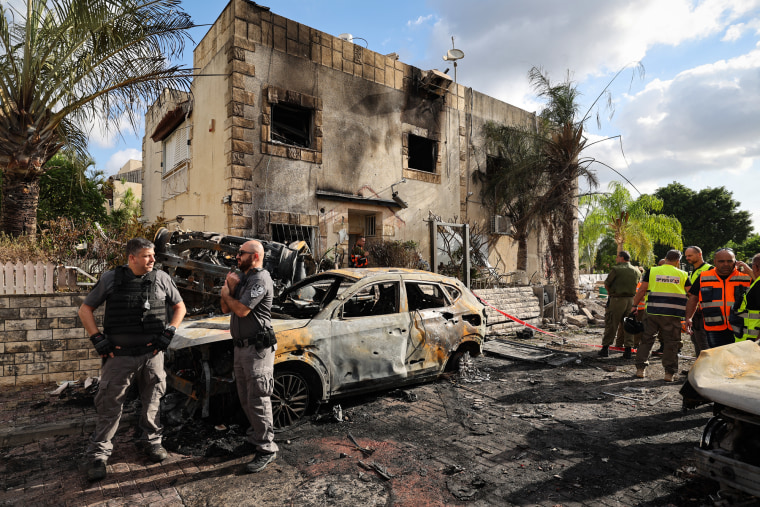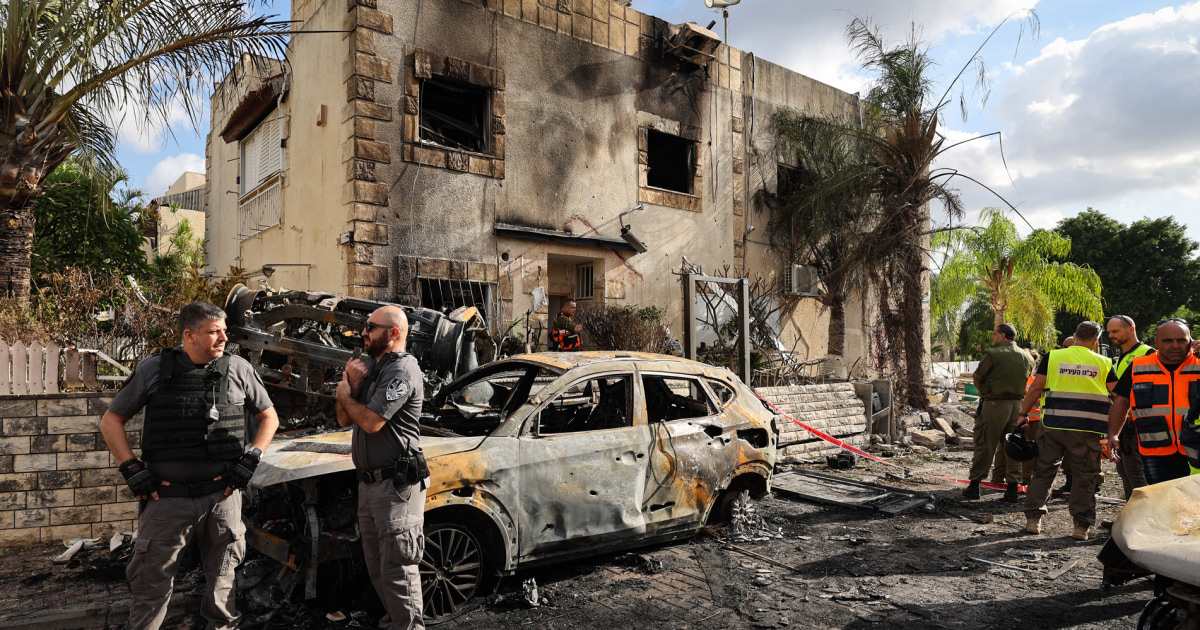KIRYAT BIALIK, Israel — Those who remain in the northern city of Kiryat Bialik are preparing for the worst-case scenario: a full-blown war between Israel and the Hezbollah militant group just across the country’s northern border with Lebanon.
After months of tit-for-tat cross-border attacks, the damage in the city in Israel’s Haifa region is plain to see. An attack Sunday damaged several buildings, blowing out their windows, leaving a trail of mangled metal, shattered glass and charred brick.
It was one of multiple attacks launched by the Iran-backed militant group over the weekend and into Monday, many of which were met with forceful responses from Israel. Lebanon’s health ministry said 274 people were killed and more than 1,000 were injured by Israeli airstrikes Monday.
Surveying the damage in Kiryat Bialik on Monday, Ilan Itach was counting his blessings that his family and home for more than 30 years had survived the attack unharmed.
Itach, 62, told NBC News that his wife, son, daughter-in-law and 5-year-old granddaughter had run into a shelter as the explosions rang out.
“The entire family is all right, but they are very afraid,” he said, adding that they had left the city to join relatives in another part of northern Israel.

Approximately 63,500 people have been displaced from the country’s north since Oct. 8, according to statistics from the office of Israeli Prime Minister Benjamin Netanyahu.
Many felt they had little choice to move after Hezbollah, which the U.S. has designated a terrorist organization, began to fire on Israel shortly after Hamas’ Oct. 7 terror attacks, in which about 1,200 people were killed and Palestinian militants took around 250 hostages. Israel’s offensive in the Gaza Strip since then has killed more than 41,000 people, according to health officials in the enclave.
While Israel focused its military campaign on Gaza, it has struck targets belonging to the militant group in Lebanon on a near daily basis, often in response to strikes on its territory.
The conflict has displaced more than 100,000 people in southern Lebanon, according to the International Organization for Migration.
Itach said he approved of his country’s attempts to put an end to the attacks. “We need to finish it off,” he said. “You can’t go on like this. We need either peace or war. You can’t have this in-between.”
Farther south in the city of Haifa, Israel has moved patients to an underground facility at the Rambam Hospital that normally serves as a parking lot.
Sitting below sea level, around 30 feet below the main hospital, the fortified area is now home to a maternity ward, a pediatric facility and areas for intensive care, dialysis and neurosurgery.
Built after Israel’s war with Hezbollah in 2006, the facility was used briefly during the Covid-19 pandemic, but it has never been put on a war footing.
But Michael Halberthal, the hospital’s director, said all the patients had been moved Sunday over the course of eight hours. It’s now buzzing with people and crammed full of beds and dividers.
“The risk assessed by the Home Front Command is that we will be under attack,” Halberthal said. “Obviously, we don’t want to harm or injure any of our patients.”
On Monday, patients were receiving blood transfusions and dialysis. Four babies have been born in the underground delivery rooms since Sunday.
The underground facility can accommodate up to 8,000 people, including patients, family members and staff members, Halberthal said.
There are flushable toilets and showers in former parking spaces, and an electronic board lists the number of patients and equipment. Staff at the command center watch multiple screens and CCTV cameras, as they are coordinating with police and emergency services.
“It’s extremely sad,” Halberthal said, adding that he personally doesn’t think things are going toward another major war. “Unfortunately for us in Israel, military confrontation is part of our risk assessment.”
Richard Engel and Charlotte Gardiner reported from Kiryat Bialik. Yuliya Talmazan reported from London.

Leave a Reply